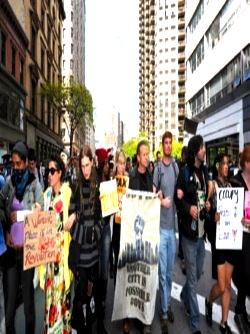Freedom under Attack!
Canadians are known for being polite. Sometimes politeness here goes to the extreme. Go for a walk in my neighborhood and come to a corner the same time a car does, and there will be a friendly standoff—with each gesturing for the other to go first.
Certainly there are plenty of impolite people here in Canada, but citizens of the United States often recognize Canada’s culture of niceness and friendliness when they describe their neighbors to the north. Yet, this very politeness conceals a war against the God who taught His followers to love their neighbors as themselves (Matthew 22:39).
Many who applaud the spread of “liberal” and “progressive” values are pleased that Canadian courts now consider same-sex marriage a fundamental right for all Canadians. But how many have considered that, in enforcing this right, the Canadian courts are trampling on the rights of sincere individuals who are charged with performing marriages. For example:
“Saskatchewan’s top court has decided that proposed legislation allowing provincial marriage commissioners to refuse to perform same-sex weddings on religious grounds violates the constitution.
Marriage commissioner Larry Bjerland, of Rose Valley, Sask., said he was disappointed by the decision from the appeal court.
‘We’re not asking for a whole lot,’ he said. ‘All we’re asking for are the same rights that anyone else has—and that’s to refuse to do work. If the work is contrary to what your religious beliefs are, then you shouldn’t be forced into doing it’” (CTV.ca News Staff, January 10, 2011).
Already several judges and justices of the peace have been fired or forced to resign their positions because of this ruling. For now, members of the clergy are exempt from the rule, but no one can say whether or for how long this exemption will last. Many Canadian pastors are deeply concerned, as they perceive that the trend has been for long-established religious freedoms to be “trumped” by the desires of activists seeking to exercise their new-found and non-traditional freedoms.
Carters and Associates, a law firm specializing in issues that affect churches and charities, recently published a note with the following headline: “Discrimination Based on Gender Identity or Expression to be Prohibited in Ontario.” Discussing Bill 33, a piece of proposed legislation in Ontario that would modify the province’s Human Rights Code, they comment as follows: “The Code will provide that every person has the right to equal treatment without discrimination because of ‘gender identity’ or ‘gender expression’ with respect to employment, services, accommodations, contracts and memberships in vocational associations.…”
And who are those covered by the provisions of this legislation in the eyes of the Ontario Human Rights Commission? “Individuals whose birth-assigned sex does not conform to their gender identity include transsexuals, transgenderists, intersexed persons and cross-dressers” (Carter’s Charity Law Bulletin, No. 285, June 27, 2012).
Once this new law is in force, charities and not-for-profit organizations operating in Ontario will be subject to the new amendments. Currently, the law provides exemptions for churches, but this legislation is so new that observers cannot be sure exactly how churches will be affected.
The Supremacy of God
These recent developments pose a problem for those who sincerely believe in the opening statement of the Canadian Charter of Rights: “Whereas Canada is founded upon principles that recognize the supremacy of God and the rule of law.…” Where in these recent developments are the rights of Canadians who recognize the supremacy of God and the rule of His law? By the terms of the Charter of Rights, they should not be required to compromise their consciences. Part 2 of the Charter contains the following provision: “Everyone has the following fundamental freedoms: (a) freedom of conscience and religion; (b) freedom of thought, belief, opinion and expression, including freedom of the press and other media of communication; (c) freedom of peaceful assembly; and (d) freedom of association.
Did the architects of the Charter, and do those who today love to turn to it to justify their abandonment of long-held societal values, expect sincere believers to ignore God’s plain instructions, such as His command, “A woman shall not wear anything that pertains to a man, nor shall a man put on a woman’s garment” (Deuteronomy 22:5)? Clearly, much has changed since the Charter was given royal assent on March 29, 1982.
For several years, Section 13:1 of the Canadian Human Rights Act, which established extrajudicial “Human Rights Commissions,” has been of great concern to Canadian citizens. Many—especially those with strong religious beliefs—have seen it as a tool used by special interest groups as a bludgeoning club against free speech, especially point (b) of the Canadian Charter of Rights. An editorial in the respected National Post made the blunt assessment that these commissions “are out of control, far more interested in imposing political correctness than defending free speech” (“A Bit Late for Introspection,” National Post, June 19, 2008).
The editorial goes on: “It is increasingly obvious these commissions were set up deliberately to lower the standard of proof and get around rules of natural justice, thereby ensuring people who would never be convicted in court are punished to the satisfaction of the activists and special interest groups that hover around the tribunals.… Truth is not a defence. Defendants are not always permitted to face their accusers. Normal standards for assuring the validity of evidence do not apply. Hearsay is admitted.… No wonder the CHRC has a 100 percent conviction rate on hate speech complaints” (ibid.)
There is some recent good news, however, on the free speech front, as the Human Rights Commissions are no longer being allowed to act on the problematic Section 13.1 regulations of the Human Rights Act. As reported by MacLean’s Magazine, “Section 13 of the Canadian Human Rights Act slipped quietly beneath the waves last week [June 6, 2012] during a nighttime sitting of the House of Commons—victim of a private member’s bill and a trailer load of toxic publicity” (June 25, 2012, p. 15).
The Myth of Neutrality
A particular set of speech-restricting regulations may be gone, but secularist challenges to religious freedom continue. It is a mistake for any country to think of secularism as neutral. It is not! Secularism only masquerades as neutral, and with its political correctness tool it wages war against traditional and biblical values. The number of cases that demonstrate a secular bias in Canada are too numerous to recite, but one typical example involves the legal case of S.L. v. Commission scolaire des Chênes. Canada’s Supreme Court ruled that Roman Catholic parents of schoolchildren in Quebec could not have their children exempted from an “Ethics and Religious Culture” course that treated biblical accounts as myths and legends (“Supreme Court Affirms Right of Province To Implement Religious Course,” Canadian Council of Christian Charities, February 17, 2012).
As in so many other countries, biblical and family values in Canada are being overturned by militant and vocal minorities. This is not surprising when one understands Ephesians 2:2, which speaks of “the prince of the power of the air, the spirit who now works in the sons of disobedience.” This spirit power is none other than Satan the Devil, “the god of this age” (2 Corinthians 4:4), who is actively deceiving the whole world (Revelation 12:9). When it comes to the prince of the power of the air working in the sons of disobedience, Canada is not exempt!






